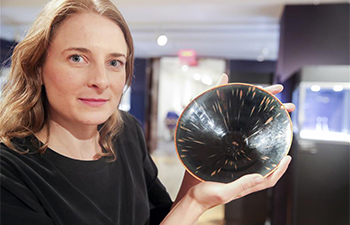by Raul Menchaca
MATANZAS, Cuba, March 17 (Xinhua) -- Under a pounding sun, a group of men, armed with chain saws, cut down the trees at an old citrus plantation in a plain in western Cuba, previously known for its high production of oranges, grapefruit and lemons.
An invasion of the Huanglongbing plague, also known as a citrus greening disease, forced authorities to demolish large areas planted with citrus in the state-run Victoria de Giron Agroindustrial Company, located in the municipality of Jaguey Grande, about 140 km southeast of Havana.
Losing the plantation was not the only problem for the company, which also had to face having a large volume of cut wood that remained on the fields without ever being put to use.
The decision of the managers was to start using this wood waste in the production of coal, a product that has historically been developed by in the area.
They have joined the ranks of company personnel and sell their entire coal production to the company itself, through a beneficial contract.
"The work is hard but you get used to it," said one of the farmers, Alexis Macias, a tall 47-year-old who has been a woodcutter since 1993 but now also produces coal.
He received everything he needs for the job free of charge, from the chain saw to the sacks and the strings to tie them up, and in exchange he sold between three and four tons of coal every month to the company.
Today his monthly income is more than before, which may increase depending on the quality of his production.
The process of cutting firewood and coal processing today involves some 600 farmers from Jaguey Grande and four other municipalities near the area where the company is located. Last year, they exported some 3,500 tons of coal to Turkey and Canada.
The gradual exhaustion of the debris from the demolished citrus plantations has not been an impediment to the work of the farmers, who now focus their attention on the dense marabou forests, an invasive tree of the Mimosaceae family that covers Cuban fields.
Now 95 percent of the coal in the area is made with the marabou as raw material and only five percent, comes from the citrus waste.
That coal is sold under the "Cubanita" brand for 350 U.S. dollars a ton, and is of a higher quality than the one made with white firewood. This is because, although it takes longer to ignite, it lasts twice as long, thus making it more expensive on the international market.
That is one of the reasons why the company is committed to a productive increase in its production of charcoal, although the selection for quality is made in a manufacturing plant with Spanish technology, where the final product is also packaged.
"We could meet our planned productive goal in the first two months of the year. We also think that there will be an increase from the second semester, so it is very likely that we can exceed the annual plan," said Humberto Suarez, the deputy director of the company.
Benefiting from better prices and work equipment, the charcoal burners of Jaguey Grande are part of a productive mechanism that Cuba has launched to export a type of domestic fuel now being transformed into a growing export item.













